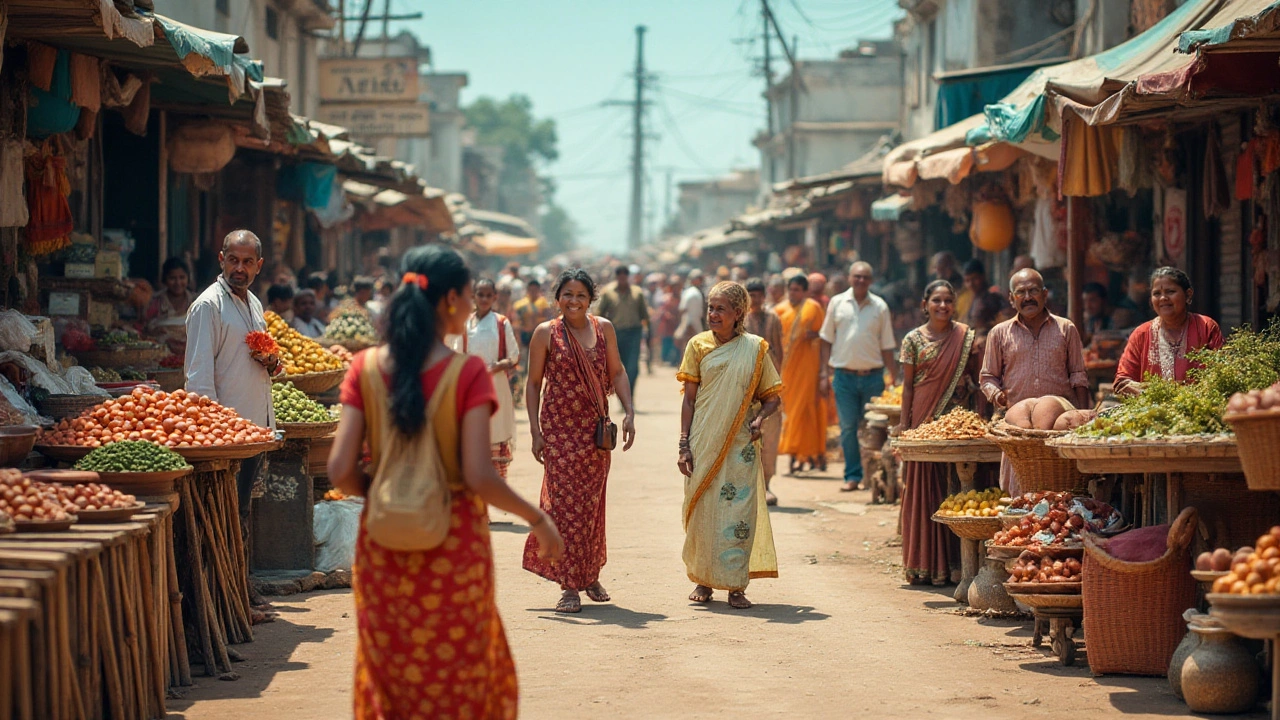In recent years, the need for sustainable practices has fired up conversations around the globe, pushing the necessity to explore alternatives to single-use plastics. Diverse countries have stepped forward, challenging norms to create eco-friendly environments. These pioneering nations aim to minimize plastic use, and in doing so, inspire others to follow suit.
From Bhutan's holistic approach to Costa Rica's ambitious policies, several countries are setting benchmarks in the fight against plastic pollution. The shift from traditional plastic use is not only crucial for environmental health but also alters the landscape of global manufacturing industries.
Let's journey into the inspiring efforts of these countries to understand their motives and methodologies. As we explore their success stories, discover actionable tips on how each one of us can make a difference, fostering a collective movement towards a sustainable future.
- Understanding the Plastic Problem
- Countries Making Significant Progress
- Innovative Policies and Initiatives
- Impact on Global Plastic Industry
- How Individuals Can Contribute
Understanding the Plastic Problem
Plastic, the marvel of modern engineering, has transformed lives with its versatility and utility. Yet, its very convenience has spiraled into a colossal environmental dilemma. Across the globe, single-use plastics—bottles, bags, and straws—litter oceans, choke marine life, and litter urban landscapes. Each year, millions of tons of these non-biodegradable plastics find their way into our waterways, prompting a crisis that entangles wildlife and disrupts ecosystems. This widespread pollution isn't just an eyesore; it brings lasting damage to biodiversity and human health alike. Microplastics, tiny fragments that break down from larger debris, have infiltrated water supplies, food chains, and even the air we breathe, compounding the global footprint of plastic waste.
The crux of the problem lies in the production and disposal cycle. With the exponential growth of plastic manufacturing, not enough attention has been paid to strategies for recycling and waste management. A startling 91% of all plastic ever produced hasn't been recycled—a heedless trajectory considering it takes hundreds of years for plastic to decompose. Alarmingly, if trends continue, oceans might hold more plastic than fish by 2050. Countries across the world are now grappling with this reality, leading the charge to mitigate the grave consequences of plastic waste.
Moreover, the challenge of reducing plastic consumption isn't just about eliminating straws or bags; it calls for a comprehensive restructuring of industrial and legislative approaches worldwide. As echoed by environmental activist David Attenborough in his ambitious conservation series, "We need to dramatically reduce the amount of single-use plastic in our lives and change our throwaway culture."
"What we do in the next few years will profoundly affect the next few thousand years," warns the broadcaster and natural historian.This includes reimagining packaging, investing in biodegradable alternatives, and nurturing global partnerships to develop infrastructure that supports sustainable disposal practices.
The ripple effects are evident in the plastic industry's impact on climate change as well. Producing plastic is an energy-intensive process reliant on fossil fuels, which directly contributes to greenhouse gas emissions. With the awareness of this connection gaining traction, it is crucial for nations to integrate environmental safeguards into economic policies. Countries that prioritize the reduction of plastics are not only undertaking environmental initiatives but are also positioning themselves to innovate globally. This shift is crucial for sustainable development, requiring coordination between policymakers, producers, and public consciousness. Together, these factors reflect the crucial need for stronger commitments and global harmonization towards a sustainable living environment free of plastic pollution.
Countries Making Significant Progress
Across the globe, several countries are shining brightly in their mission to become plastic-free countries. One name that often surfaces in these conversations is Kenya. In 2017, Kenya implemented one of the world's strictest bans on plastic bags, a move that took the world by surprise. The effectiveness of this ban cannot be overstated as the nation witnessed a significant reduction in plastic waste piling on its streets and waterways. Kenyan citizens initially found the change challenging, but gradually, they have adapted to using alternative materials, showcasing resilience in the face of environmental challenges. Such progressive steps not only position Kenya as a leader in sustainability but also inspire other nations to consider similar policies.
Bhutan also strides ahead in this cause, with its commitment to be the first fully organic and zero waste country. The nation has embraced a holistic approach, deeply rooted in its culture and environmental ethics. Bhutan has a unique philosophy of Gross National Happiness, which integrates responsible living and environmental sustainability. This philosophy extends to its commitment to reducing plastic consumption, with numerous campaigns encouraging citizens to opt for biodegradable products.
Costa Rica is another remarkable example. The country declared its intention to become the first nation to eliminate all single-use plastics by 2021. This ambitious goal, coupled with the deployment of inventive strategies like replacing plastic with biodegradable alternatives and incentivizing businesses to adopt sustainable practices, has marked Costa Rica as a trailblazer in environmental conservation. The country's lush biodiversity stands as a testament to its commitment to sustainable living, fostering an enviro-friendly atmosphere that has a significant impact on the global plastic narrative.
Trailblazing Policies and Their Impact
Several European nations are also making headway; among these, France and Germany have implemented stringent measures against plastic usage. France has legislated against various single-use plastic items, aiming to phase them out by 2040. Such a forward-thinking policy highlights the nation's dedication to protecting the environment while stimulating innovations in the plastic manufacturing sector. Germany, renowned for its efficient recycling systems, has embraced various strategies to reduce plastic consumption, emphasizing the reuse of materials. This strong focus on sustainability offers a blueprint that other countries might adopt.
These countries' efforts are not only restructuring the landscape of product consumption but also steering major changes within the global plastic industry. As regulatory pressures mount worldwide, industries must pivot towards sustainable alternatives, ultimately leading to advancements and new opportunities within the sector. A recent survey found that consumer demand for sustainable products has driven companies to explore eco-friendlier options, signifying a positive shift influenced by governmental policies.
"The fight against plastic pollution is a global challenge, one that no country can tackle alone," remarked Erik Solheim, former Executive Director of the United Nations Environment Programme. "It's heartening to see nations stepping up with robust actions, proving that change is not only possible but achievable."
Through innovative policy implementation and active citizen participation, these countries are not only challenging the status quo but lighting the path for others to follow. As we continue to look toward a future free from unnecessary plastic waste, these trailblazers serve as a beacon of what can be accomplished when communities and governments jointly commit to sustainability.

Innovative Policies and Initiatives
Globally, some countries have recognized the pressing need to reduce plastic consumption and have come up with groundbreaking policies and initiatives. These efforts are not just administrative but also rally the spirit of communities to adopt sustainable practices. What makes these policies exemplary is their ability to convert theoretical ideas into actionable change on the ground. For instance, Rwanda has taken a firm stance against plastic bags since 2008, earning the nickname as one of the cleanest countries in Africa. This bold step to ban plastic bags was supported by rigorous enforcement and encouragement towards sustainable alternatives, which, over time, fostered a cultural shift towards zero waste. Such policies are not just about removing plastic from the equation but also about education and community involvement, which empower citizens to responsibly manage waste.
Then there's Costa Rica, aiming to become the world’s first country to be free of single-use plastics by 2021. Although ambitious, the country’s plan includes replacing conventional plastics with biodegradable alternatives. It's a comprehensive approach that brings together government, industry, and citizens. This initiative involves significant public-private partnerships to research and develop new materials and technologies. It also integrates educational campaigns to ensure these changes are sustainable in the long term. As a result, Costa Rica has become a beacon of hope and a model for effective environmental policy and community action.
On the other side of the globe, the European Union has implemented a directive to eliminate single-use plastics by 2021. This policy targets commonly littered plastic items such as straws, cutlery, and Styrofoam items, representing a major step forward in the fight against marine pollution. To ensure compliance, the EU supports extended producer responsibility schemes, urging manufacturers to be accountable for the lifecycle of their products. The initiative is also accompanied by public education programs that encourage citizens to participate in the process of transitioning towards sustainable alternatives. There’s also an emphasis on research and development, encouraging innovations across the continent to reduce reliance on non-degradable materials.
"The steps we take now will determine the future of our planet, and eliminating single-use plastics is a cornerstone of that future," said Frans Timmermans, former First Vice-President of the European Commission.
These innovative policies not only disrupt traditional plastic manufacturing processes but also reshape consumer habits and industries towards a more sustainable world. By envisioning a future without plastics, these pioneering countries are setting benchmarks, inspiring others to adopt similar bold measures. The ripple effect of these changes is slowly but surely making its way across continents, sparking a global movement towards sustainability. Understanding these initiatives can empower individuals and societies to make more informed choices, contributing to a cleaner, eco-friendly planet.
Impact on Global Plastic Industry
The movement towards a plastic-free existence is having a profound ripple effect on the global plastic industry, transforming it in unforeseen ways. Countries leading this initiative are not merely shifting consumption patterns but are also reshaping production trends. As governments roll out stringent regulations and enforce bans on single-use plastics, manufacturing companies are being pushed to rethink their strategies and innovate. This change is more than just a compliance issue. It has stimulated a wave of creativity as industries explore biodegradable alternatives that don't sacrifice utility or convenience.
Companies that once thrived on mass production of traditional plastics are now directing their research and development towards sustainable materials. For instance, innovations in biodegradable plastics made from plant-based sources like cornstarch or hemp are gaining traction. These solutions demand a full circle view—from how these materials are sourced, processed, and ultimately disposed of—is crucial for ensuring they are truly sustainable. The shifts are inspiring, sparking a broader conversation about environmental responsibility across industries worldwide.
In 2022, the global biodegradable plastic market was valued at $3.51 billion and is expected to continue growing as more businesses adopt these alternatives. This growth reflects not only the increasing demand for sustainable products but also the ethical stance of companies as they align with environmental standards. Such dynamic growth emphasizes how interconnected policy changes in pioneering nations can spur global progress. Greenpeace's global project leader remarked, "The resistance against traditional plastics has empowered businesses and innovators worldwide to rethink, research, and redo the material footprints they leave behind."
Sustainable living does not solely rest with policy-makers; the role of consumers is equally pivotal. The demand created by conscientious buying has encouraged industries to adapt. As individuals show preference for products that boast eco-friendliness, corporations have no choice but to pivot, leaning into the valuable insights gained from plastic-free pioneers. There is evident pressure on industries tied to traditional plastic production to evolve, which in turn has encouraged greater investment in sustainable technologies and methodologies. Despite the initial challenges, the shift towards degradable materials signifies a pivotal moment for human progress, complementing the ongoing environmental impact mitigation efforts.

How Individuals Can Contribute
On our journey toward a more sustainable planet, individual actions truly make a grand difference. Although it might seem like one's choices are just a drop in the ocean, these small, consistent changes can accumulate to forge lasting global impact. Beginning with rethinking daily habits can pivot one's lifestyle toward achieving a zero-waste goal. Start by examining consumption patterns, identifying areas where you can reduce the use of single-use plastics, and opting for reusable alternatives. For instance, replacing plastic shopping bags with cloth counterparts not only cuts down waste but also empowers markets to drive demand for sustainable products.
Bear in mind, the fight for a plastic-free world extends social benefits as well. Reducing plastic consumption translates to supporting communities that rely on traditional, eco-friendly methods of packaging and transport. By purchasing products from businesses that have adopted sustainable practices, individuals contribute to a broader economic shift. Many countries striving to be plastic-free already incentivize such practices, and you can directly support them by aligning your purchasing habits with these eco-friendly choices. For example, embracing biodegradable packaging, and investing in locally-sourced food reduce the carbon footprint.
Education is also pivotal. Committing to learn and share information about the impact of plastic and the benefits of low-waste living can spark change within your community. Participate in or initiate local clean-up activities, or even a campaign for plastic alternatives, driving awareness on crucial environmental issues. In this shared journey, interpersonal influence is key. Consider this compelling thought shared by the Ellen MacArthur Foundation: "By design, a circular economy focuses on 'designing out' waste and pollution, keeping products and materials in use, and regenerating natural systems."
“It starts by understanding the ripple effects of our disposable culture and proactively adopting circular economy principles.”Engaging in dialogue with friends and family aligns personal practices with larger global policies.
Lastly, championing policy changes makes a substantial difference. Advocate for local and national policies encouraging the reduction of plastics and boosting the development of alternatives. Voting for leaders and laws prioritizing environmental protection can tackle plastic pollution at the societal level. Governments in countries making significant strides towards being plastic-free often rely on public input and support to execute viable, long-lasting policies. Individuals deeply rooted in sustainability become essential allies to these nations, advocating pivotal conversations as related to community-driven change. Small shifts in how we live echo globally, proving that conscious, collective action can indeed yield transformative outcomes.
